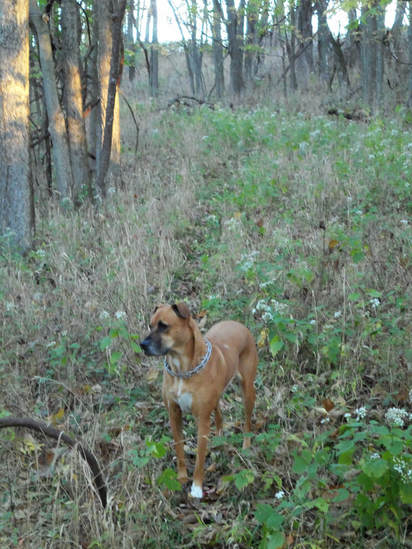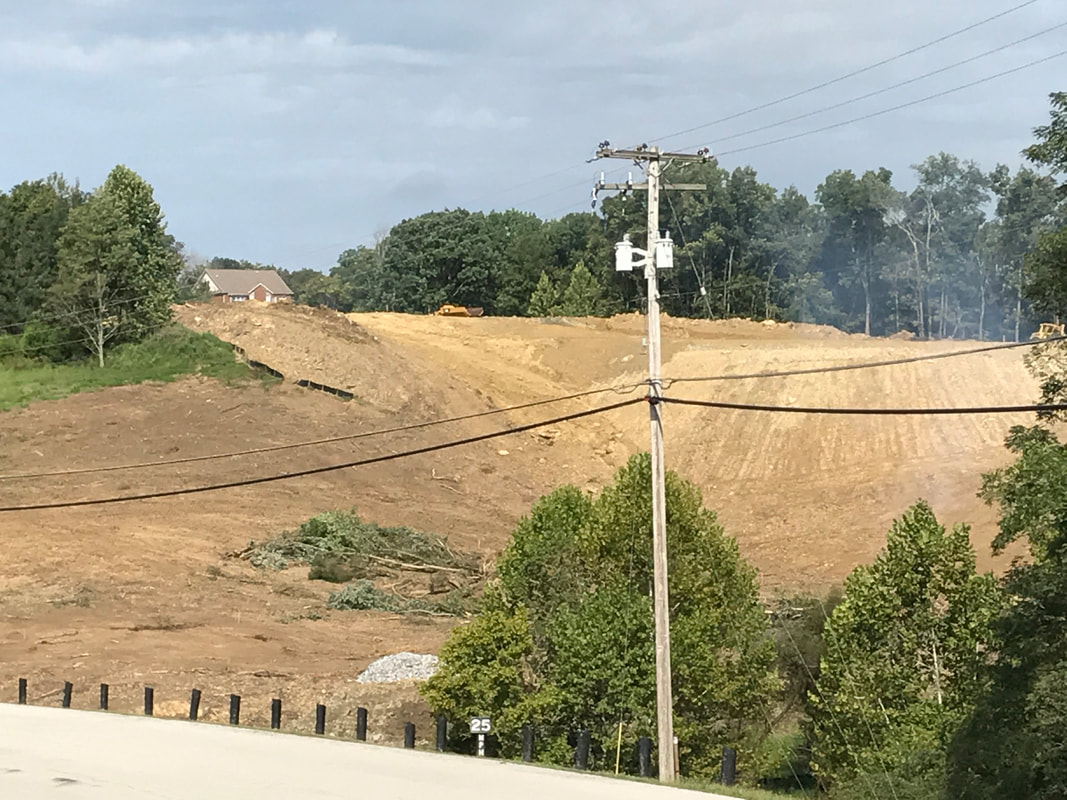 Lucy on the "old road." (Photo by Rick Showalter) Lucy on the "old road." (Photo by Rick Showalter) Each October Rick and I look forward to our first walk down an old farm road near our house that in recent years has been taken over by a deciduous forest. The footpath is inaccessible in the summer, when the dense ground vegetation makes it nearly impassable. But as fall arrives, and the undergrowth begins to die away, we clear a path for daily walks. Our dog, Lucy, loves it as much as we do. It gives her new territory to sniff and new space to roam. It lets us feel like we have stepped out of our built world and into the heart of a woods. Each year we also find that nature has somehow altered our path. A large tree has come down, forcing a detour. Oversized thorny bushes convince us to try a new route. Rains carve out a gully we have to step around. We take all of this in stride. It’s fun to forge a new path, to see the woods from a slightly different perspective. But across large swaths of the southern United States, two powerful hurricanes have altered the lives of thousands of Americans. Nature has once again roared ashore, destroying buildings, obliterating livelihoods. U.S. citizens in Puerto Rico and other parts of Florida and Texas are still recovering from last year’s storms. Humans rarely win a battle with nature—especially when we continue to deny her power and resent any implication that our indulgences are contributing to her erratic behavior. A report issued Oct. 8 by the U.N.’s Intergovernmental Panel on Climate Change finds that these catastrophes will only get worse unless we hunker down and take the necessary steps to reduce global warming. If we don’t, it could cost us trillions of dollars. A New York Times article describes the threats we are facing as “a world of worsening food shortages and wildfires, and a mass die-off of coral reefs as soon as 2040” as well as “intensifying droughts and poverty” and “increased coastal flooding.” Forestalling this cataclysm will take international cooperation and a complete transformation of our economy, according to the report. We all know how likely that is to happen. But when change is in our control, when we can alter our behavior to avoid such devastation, wouldn’t that be the obvious choice? Wouldn’t we at least want to take incremental steps to prevent worldwide suffering and economic loss? Why do we keep waiting? Back along our woodland path, we see that the adjoining property has been cleared for a new home. Construction is ongoing. The owner is a friendly man, who loves my dog. But I can’t help thinking how human action has once again destroyed a small area of natural land. This morning I saw two deer wandering down the middle of the main road through our neighborhood. They looked perplexed. They had just emerged from a small copse of woods on one side of the road. Normally, they bound immediately across the road, into the protective woods on the other side. But today the woods are gone. Acres of trees that have stood for decades have been bulldozed to make room for 50 more houses. Heavy equipment roars and beeps day and night. A whole hillside has been moonscaped. I know the place where my house sits was once woodland, too. The remnants of the deciduous forest remain along the shoreline of the lake. I realize this area was also cleared for development. But in our part of the neighborhood, the houses were tucked into the existing trees. The sharp hillsides were allowed to remain. The natural contours of the land are still evident. Being the caretakers of this land is a privilege. I understand that we have to accommodate the needs of the people who depend on it for sustenance. But isn’t it also possible to be thoughtful guardians, protectors of both the wild inhabitants and the future generations who will need to inhabit it? After all, we’re all dependent on each other for life. We cannot breathe if not for the woods. Our breath gives them sustenance. Every creature large and small plays a role in our complex ecosystem. We may think we hold sway over all that is on this planet. That we have the power to manage it all for our own purposes. That is, until the next mammoth storm or wildfire or flood. And then we are reminded that nature always wins. That we have to be the ones to step out of the way of the fallen tree and think hard about how our actions contributed to its demise.
1 Comment
Hannah HELM
11/16/2018 10:05:35 am
I SO enjoy this blog. I hope I can recruit some new readers. It was a happy coincidence for me to connect with Rick through the Audubon hike.
Reply
Your comment will be posted after it is approved.
Leave a Reply. |
Details
Archives
June 2023
Categories
All
|




 RSS Feed
RSS Feed